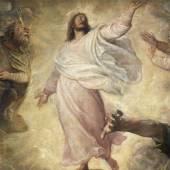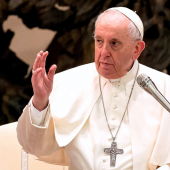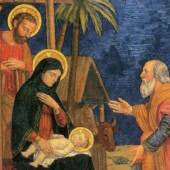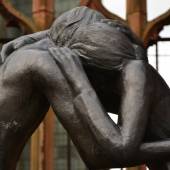Transfiguration of the Lord
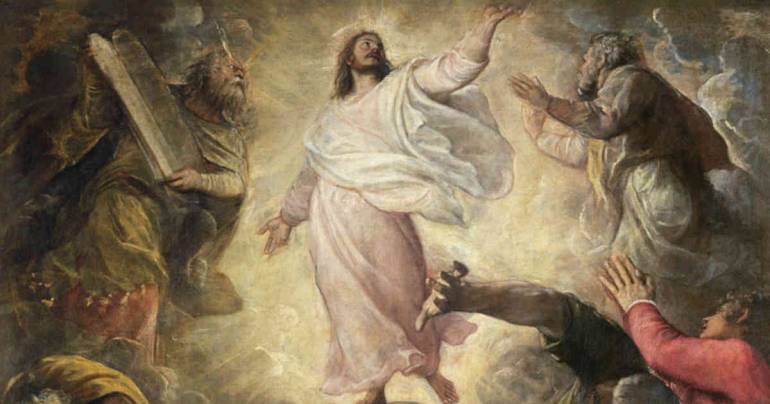
August 6, Transfiguration of the Lord
Daily Readings: 1st reading: Daniel 7:9–10, 13–14; 2nd reading: 2 Peter 1:16–19; Gospel; Matthew: 17:1–9.
Holy Mother Church invites all believers to celebrate the Feast of the Transfiguration of the Lord Jesus. The event of Transfiguration is a moment of Divine Revelation or Manifestation. Traditionally Mount Tabor is accepted as the location of Jesus’ glorious appearance.
God chooses to reveal the divine majesty and power of Jesus as the Son of God: Why God is pleased with him and why the world should listen to him. We are called to bear witness to Jesus and his powerful presence in the world in the Word, the Sacraments, and the believing community, and so on!
The First Reading from the Book of Daniel introduces God as the Ancient One and Jesus as the Son of Man, the King, and thus the Kingship of God is highlighted. Both of them appear in the heavenly court. Heavenly court and those in it are described in apocalyptic language. The Son of Man receives everlasting dominion, glory, and kingship from God. All peoples, nations, and languages serve him. Jesus owes his everything to God. We understand that this passage has to be interpreted in a Christological light. That is why it is chosen to be read on this day.
The Responsorial Psalm declares that the Lord is King, the Most High over all the earth. When the Psalmist speaks about what happens to the mountains before the Lord, he could have had Mount Sinai in his mind. The Psalm certainly gives hope to the righteous as the author unravels God’s reign. Two themes dominate this Psalm: Joy/Rejoicing and Righteousness.
As the New Interpreter’s Bible says, “Those who submit themselves to God’s rule will derive their character from God’s character. Because God rules, there is the possibility that people can be righteous too”. That means we can meditate upon God’s righteousness and human righteousness.
The Second Reading from the Second Letter of St. Peter speaks about the transfiguration of the Lord Jesus on the holy mountain. The author of the Letter claims to be an eyewitness of the event which is not a cleverly devised myth. It is at this moment that Jesus received honor and glory from God the Father. This is what connects this reading with the First Reading.
God grants a certificate to Jesus and declares him to be His son, His Beloved with whom He is well pleased. These words were uttered regarding Jesus at the time of the baptism. At the time of transfiguration, the clarion call was that humanity must listen to him. By citing this, Peter claims to possess a prophetic message which is reliable. The advice to be attentive to this message will make the believers shine like a lamp in a dark place until the day dawns and the morning star rises in our hearts.
The Gospel Reading narrates the event of Transfiguration. There is a theological ‘building up’ of momentum for this event. Peter declares Jesus as the Messiah, the Son of the living God. Jesus wants to reveal what sort of Messiah he is by foretelling his impending Passion, Death, and Resurrection. Peter refuses to accept Jesus’ plan.
Making use of this opportunity, Jesus speaks about the cost of discipleship. Amid the confusion, refusal, and struggle to comprehend the type of Messiah that Jesus is, he takes Peter, James, and John apart on a high mountain to reveal his divine majesty. It is thus a moment of clarification.
The presence of Moses and Elijah with Jesus reminds us of the words of Jesus, “Do not think that I have come to abolish the law or the prophets; I have come not to abolish but to fulfill” (Matt 5:17) and “…that everything written about me in the law of Moses, the prophets, and the Psalms must be fulfilled” (Luke 24:44).
The disciples who heard the voice from heaven became witnesses to what the heavenly voice spoke. That is why Peter says that he was a witness to what happened on Mount Tabor. The believers are witnesses to what happens at the altar every time the Holy Eucharist is celebrated.
Are we ready to become actual witnesses of Jesus?
Radio Veritas Asia (RVA), a media platform of the Catholic Church, aims to share Christ. RVA started in 1969 as a continental Catholic radio station to serve Asian countries in their respective local language, thus earning the tag “the Voice of Asian Christianity.” Responding to the emerging context, RVA embraced media platforms to connect with the global Asian audience via its 21 language websites and various social media platforms.









